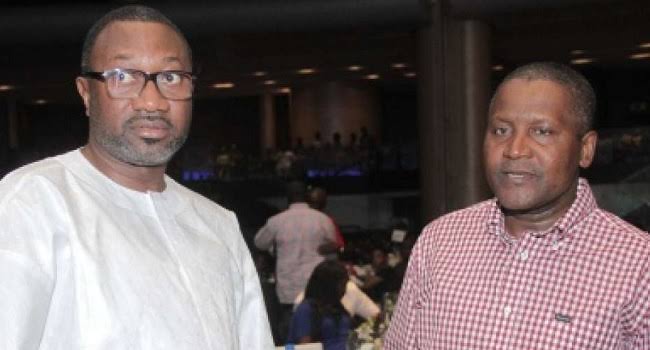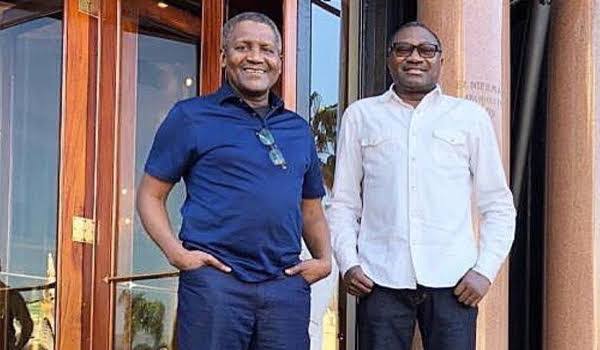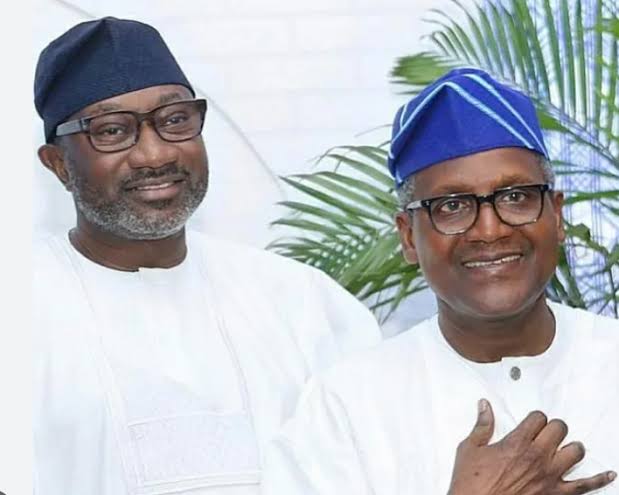In Nigeria’s high-stakes economic chessboard, few alliances resonate as loudly as the enduring friendship and strategic loyalty between two of its wealthiest sons: Femi Otedola and Aliko Dangote.
One is a savvy oil and power magnate with a flair for calculated exits and reentries; the other, the cement and refinery emperor whose industrial ambitions remain unmatched in Africa.
Their names stand tall among the richest and most influential figures on the continent, but behind the staggering wealth lies something deeper: a bond rooted in trust, mutual ideology, and an unspoken economic pact that has shaped the trajectory of several industries.
What compels Femi Otedola—a billionaire in his own right—to so publicly and financially support Aliko Dangote, even in the most uncertain moments?
This article dives deep into decades of friendship, high-stakes investment, loyalty under pressure, and the subtle dance between power and principle.
THE GENESIS OF A BILLIONAIRE BOND

Their paths first crossed in the late 1990s when Nigeria’s economy began welcoming private sector reforms. While Dangote was expanding his import-export empire into manufacturing, Otedola was scaling Zenon Petroleum and Gas into one of Nigeria’s largest fuel marketers.
By 2007, both men made a bold move that cemented their alignment: teaming up to acquire the Port Harcourt and Kaduna refineries under the privatization program of President Olusegun Obasanjo.
Although the acquisition was reversed by the incoming administration of President Yar’Adua, it marked the first major joint foray by the two moguls—a signal that they were more than casual friends.
In interviews over the years, both men have credited each other as trusted advisers. Otedola has publicly stated that Aliko Dangote is one of the few people he listens to on big business decisions.
INVESTMENT OR LOYALTY? THE DANGOTE CEMENT STAKE
In January 2024, Femi Otedola made a headline-grabbing investment: he acquired a stake in Dangote Cement worth about $6.73 million. This wasn’t his first major financial foray, but it stood out.
According to Global Cement and Bloomberg, the move caused a notable bump in Dangote Cement’s share price. Analysts speculated on whether it was just another savvy portfolio expansion or something deeper. Otedola clarified in a rare statement:
“Dangote Cement’s unique position with two export terminals offers a substantial opportunity to earn foreign exchange, crucial for Nigeria’s economy.”
The timing was key. Dangote Cement was dealing with increased competition and operational challenges. The investment served not only as a financial boost but also as a loud public endorsement from one of Nigeria’s sharpest minds.
A FRIENDSHIP TESTED BY HISTORY

The most telling sign of their bond came not during prosperity, but during scandal. In 2012, when Otedola was caught in a bribery sting involving a federal lawmaker, many of his so-called allies distanced themselves. Dangote did not
In a country where friends evaporate under pressure, that silent show of support was a masterclass in loyalty.
A PUBLIC DEFENSE IN TOUGH TIMES
In mid-2024, when regulatory tensions escalated between the Dangote Refinery and the Nigerian National Petroleum Company Limited (NNPCL), few high-profile voices spoke up. Otedola did.
He penned a widely circulated op-ed calling on the federal government to support the Dangote Refinery, likening it to how other nations protect and prioritize their own industrial champions. He wrote:
“In developed economies, governments rally behind their big industrial players. We must do the same if Nigeria wants to be a competitive nation.”
It wasn’t just an economic argument. It was personal.
This act of public solidarity revealed more than strategy. It was loyalty—even when stakes were high and sentiment was mixed. In the era of silent boardroom politics, Otedola was ready to be Dangote’s megaphone.
THE DANGOTE-OTEDOLA PLAYBOOK: MUTUALITY AS A MODEL

Their relationship transcends episodic investments. Both men have shown a pattern of strategic mutuality.
When Dangote Group faced forex shortages, Otedola’s own import-export channels quietly assisted in streamlining product logistics.
When Otedola exited Forte Oil and pivoted to power, Dangote lent advice on navigating industrial scale-ups.
In philanthropy, both are aligned—regularly contributing to each other’s causes. Otedola’s donations to the Dangote Foundation and vice versa are often discreet but impactful.
CRITICISM AND THE QUESTION OF FAVORITISM
Not everyone views this alliance in glowing terms. Critics have suggested that Otedola’s public defense of Dangote could be self-serving, aimed at preserving the value of his stake or positioning for a board seat.
Others raise eyebrows at the optics: two of Nigeria’s richest men reinforcing each other in an economy riddled with inequality.
But defenders argue the opposite—that their relationship embodies what Nigeria needs more of: strategic alliances that create jobs, attract capital, and stabilize industries.
THE LEGACY THEY’RE BUILDING

Together, Otedola and Dangote have helped redefine what Nigerian capitalism can look like. From refineries to railways, philanthropy to public policy, they’ve left their footprints on nearly every major sector.
Their loyalty to each other reflects a business culture that values personal trust as much as contracts. It may not be perfect. But it’s powerful.
And in an era of economic instability, that bond may prove more stabilizing than many government policies.
FINAL THOUGHTS
Femi Otedola’s financial loyalty to Aliko Dangote isn’t just about money. It’s about legacy, influence, and the belief that some battles are worth fighting together.
Whether publicly defending Dangote during refinery regulatory clashes or silently moving capital into his cement empire, Otedola has shown that billionaire loyalty isn’t an abstract ideal—it’s a tangible, strategic force.
In an increasingly volatile economic world, the Dangote-Otedola bond might be one of Nigeria’s most underrated assets.













Leave a comment